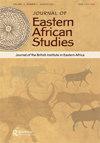The rise and fall of a Swahili tabloid in socialist Tanzania: Ngurumo newspaper, 1959–76
IF 0.6
3区 社会学
Q2 AREA STUDIES
引用次数: 0
Abstract
ABSTRACT While historians of East Africa have examined the region’s rich print cultures in the era of decolonisation, they have viewed newspapers primarily in intellectual terms, rather than as businesses embedded in capital networks. Through the Asian-owned Tanzanian tabloid Ngurumo, this article examines the political economy of newspapers and printing during the time of decolonisation in Tanzania. It argues that Randhir Thaker’s printing firm played an essential yet overlooked role in sustaining nationalist expansion in the late 1950s, before then entering the newspaper market in a period marked by racial tensions. However, the same undercapitalised business model which allowed Ngurumo to become Tanzania’s most popular newspaper then constrained its ability to expand its operations. Ngurumo’s demise in the mid-1970s was not caused by direct government intervention, but by its lack of the infrastructural and financial support which sustained the state- and party-owned press through a time of economic hardship.一份斯瓦希里语小报在社会主义坦桑尼亚的兴衰:1959 - 1976年的《ngumo报》
摘要尽管东非历史学家研究了非殖民化时代该地区丰富的印刷文化,但他们主要从智力角度看待报纸,而不是将其视为嵌入资本网络的企业。本文通过亚洲拥有的坦桑尼亚小报《Ngurmo》,探讨了坦桑尼亚非殖民化时期报纸和印刷业的政治经济。它认为,兰希尔·塔克的印刷公司在20世纪50年代末维持民族主义扩张方面发挥了重要但被忽视的作用,之后在种族紧张时期进入报业市场。然而,同样的资本不足的商业模式使《Ngurmo》成为坦桑尼亚最受欢迎的报纸,也限制了其扩大业务的能力。Ngurumo在20世纪70年代中期的消亡并不是由政府的直接干预造成的,而是由于其缺乏基础设施和财政支持,而这些基础设施和资金支持支撑着国有和政党所有的媒体度过了经济困难时期。
本文章由计算机程序翻译,如有差异,请以英文原文为准。
求助全文
约1分钟内获得全文
求助全文
来源期刊

Journal of Eastern African Studies
AREA STUDIES-
CiteScore
3.30
自引率
7.10%
发文量
12
期刊介绍:
Journal of Eastern African Studies is an international publication of the British Institute in Eastern Africa, published four times each year. It aims to promote fresh scholarly enquiry on the region from within the humanities and the social sciences, and to encourage work that communicates across disciplinary boundaries. It seeks to foster inter-disciplinary analysis, strong comparative perspectives, and research employing the most significant theoretical or methodological approaches for the region.
 求助内容:
求助内容: 应助结果提醒方式:
应助结果提醒方式:


